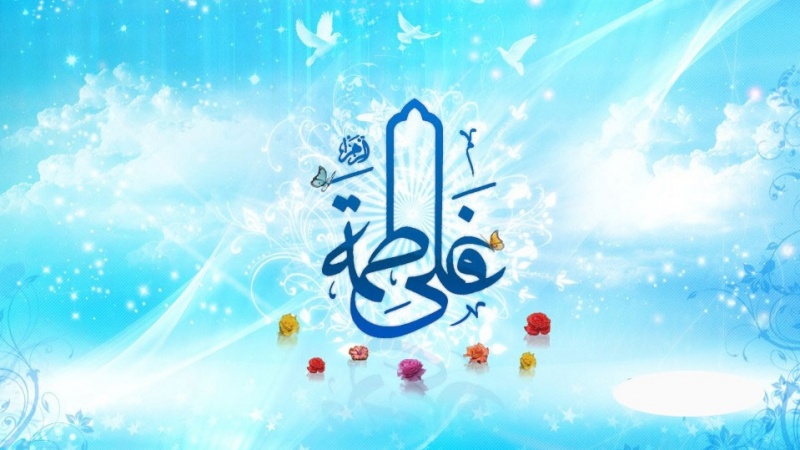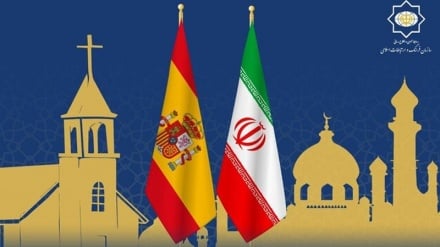The most blessed marriage & Family Day
Today, the 1st of the month of Zil-Hijjah is the auspicious anniversary of the blessed marriage of the noblest-ever pair.
It is the day on which in the year 2 AH, Prophet Mohammad (blessings of God upon him and his progeny) solemnized the nuptials of his Immaculate Daughter, Hazrat Fatema Zahra (peace upon her) with his dear cousin, the Impeccable Imam Ali ibn Abi Taleb (AS). The union of this Infallible Couple laid the foundations of the Fabulous Family, whose fruits were four immortal children – two peerless sons and two equally virtuous daughters – Imam Hasan and Imam Husain, and Hazrat Zainab and Hazrat Omm Kolsoum (peace upon them).
The following is a special feature in this regard, since this day is marked in the Islamic Republic of Iran every year as the Day of Marriage and Family.
Islam attaches paramount importance to the building of the family unit on a sound and healthy basis as the firm foundation of a progressive society. The teachings of Islam aren’t theory, as some might misconstrue. In fact, the Almighty Creator made the Prophet and his Impeccable Progeny as models of emulation in every field as is evident by their exemplary conduct. Marriage and family life are thus part of the practical precedents set by these spotlessly clear personalities for the benefit of the believers. Indeed the best and lasting demonstration in this regard was given by Imam Ali and Hazrat Fatema Zahra (peace upon them), whose marital life has continued to inspire all faithful couples in every era and place.
God Almighty says in ayah 21 of Surah Roum of the holy Qur’an:
“And of His signs is that He created for you spouses from amongst yourselves that you may take comfort in them, and He ordained affection and mercy between you. There are indeed signs in that for a people who reflect.”
As is evident by the wordings of this ayah, God has decreed marriage as the formal bond of affection and love between a man and a woman to help build a virtuous family unit, which in turn would result in laying the foundations of a sound and healthy society. It is the most revered institution in Islam, and in the words of the Prophet of Islam: “No foundation has been built in Islam more loved by Allah than marriage."
The Prophet himself set the perfect precedent in this regard, years before the formal declaration of his mission, when he accepted the offer of marriage with the most virtuous lady of his times, the monotheist Khadija bin Khuwailed, known as Tahera or the Pure, for refusing to marry any person until she came across her distant cousin, the poor but honest and ethically-upright orphaned son of Abdullah and Amena bint Wahb.
The fruit of this marriage was Hazrat Fatema Zahra (peace upon her), who was destined to be the Most Noble Lady of all times.
An impeccable lady needs an impeccable gentleman for the blessed union of marriage in order to avoid a disaster. This was this reason, Mary, the mother of the Prophet Jesus (peace upon her) stayed a virgin throughout her life. Thus, when Hazrat Fatema (peace upon her), came of age, the Prophet of Islam eagerly awaited Divine Commandment for her marriage, and in the meantime, turned away all suitors, including some of his senior companions, who accustomed to the customs of Jahiliyya in which they had spent the greater part of their idolatrous life, had sent proposals for marriage to him.
Soon the Word from the heavens came. Archangel Gabriel descended, saying:
"O Prophet of Allah, the Almighty has chosen you and made you the most respected and superior among His creatures, and has selected Ali as your brother. He the Almighty, decreed the Nikah of your daughter, Fatema, His most obedient servant, with His other most obedient servant Ali, on the 4th Heaven, where He ordered all His angels to gather, dressed in the ornaments of heaven. He then filled the 4th heaven with celestial light and ordered Adam, the Father of mankind, to recite sermon to begin the Nikah ceremony. After the sermon, Allah ordered the Angel Raheel, who has been bestowed with the most eloquent voice, to recite Hamd. He then informed me that He has performed the Nikah of His servant Fatema (peace upon her) with His other chosen servant Imam Ali, and that I should spread this news among the angels. I acted accordingly and made all the angels testify the event. Allah then ordered me to write this event in the silken cloth of paradise and present it to you."
Accordingly, the Prophet, following the proposal for marriage from Imam Ali (AS), happily solemnized the marriage of his only daughter with him; thus planting the blessed tree of perpetual munificence.
After marriage, the couple normally plans the division of works and household chores. In view of the physical differences between males and females, Islam has introduced different roles for men and women, in harmony with their respective natures. Proper division of work creates balance in family life. The handling of responsibilities by the pair thus builds mutual trust and an aura of love and affection that is so essential for raising sound and healthy children. In view of this, Islam has entrusted the husband, who is physically stronger than his delicate spouse, with the task of earning money for the household through different means including outdoor duties that require strength and endurance. It is here that the exemplary life of our divinely-appointed leaders shows us the way.
Once Imam Ali and Hazrat Fatema (peace upon them) concerning housework sought the opinion of the Prophet, who said that indoor jobs should be handled by the wife while outdoor duties is the responsibility of the husband. Hazrat Fatema (peace upon her) got happy and said: I am very pleased that the Prophet saved me from work that is related to men or causes frequent association with men. This is further proof of the fact that in Islam, in harmony with the system of creation, has allocated both men and women certain duties and responsibilities that are in line with their nature and physical characteristics.
Islam emphasizes that spiritual aspects of doing housework, and has offered the couple incentives by speaking of the rewards reserved for the husband and wife for carrying out their respective responsibilities. When a woman feels that her work is a kind of worship she will definitely strive to win the content of the Loving Creator, rather than feeling tired of bored of her duties. Moreover, in order to ease the burden of housework for women and to create affection between the couple, Islam has encouraged men to help their wives in housework as well. There are many instances when Imam Ali (AS) used to help Hazrat Fatema (peace upon her) in the housework, in addition to his outdoor duties. The Prophet’s 6th Infallible Heir, Imam Ja’far Sadeq (AS) says: The Commander of the Faithful Imam Ali (AS) used to procure water and firewood, while Hazrat Fatema Zahra (peace upon her) would grind flour and bake bread. In Islam, unlike other creeds and cultures, regards men and women as equal human beings, and it does not prevent women from playing social roles.
The history of Islam presents numerous instances of the role played by virtuous women in society – roles that did not hinder the wife’s main responsibility in the family. A woman’s work in the society usually has certain problems and sometimes it endangers her health and spirit. Yet we find in Islamic teachings and the history of Islam, how virtuous ladies dauntlessly carried out such work whenever the situation required, without neglecting their household chores.
For instance, the sudden turn of events after the passing away of the Prophet, when his instructions were ignored and the laws of God violated concerning the leadership of the Ummah, and her own patrimony of the orchard of Fadak, Hazrat Fatema Zahra (peace upon her) had no other choice but to go to the Prophet’s Mosque and address the gathering regarding the right of leadership of her husband, Imam Ali (AS). Her famous sermons are still preserved in books of history and hadith, and are indeed lasting lessons for preservation of faith and protection of the rights of both men and women. Earlier also, during the lifetime of her father, she had gone to the field of Ohad on learning of the injuries to the Prophet during the battle the infidel Arabs had imposed on Muslims. Moreover, as is evident by ayah 61 of Surah Aal-e Imran of the holy Qur’an Hazrat Fatema (peace upon her) was the only woman who accompanied the Prophet, along with her husband and two sons, on God’s commandment to the Prophet for the unique challenge of Mubahela with the Christians in order to prove the truthfulness of Islam. She carried out all these social duties, in addition to her perfect household chores, to the extent that Imam Ali (AS) used to remark: “By Allah, I never angered Fatema or forced her to do something, nor did she ever anger or disobey me. In fact, whenever I looked at her, all gloom would be removed from my heart.”
As a mother, the Lady of Light gave to the society four immaculate children – two sons and two daughters – all of whom carved out immortal niches in the history of mankind through their faith, patience, prudence, piety, valour, wisdom, forbearance and sacrifices, the peak of which is the heartrending tragedy of Karbala. If her elder son, Imam Hasan Mojtaba (AS) had relinquished the rule of a vast realm for the sake of preservation of the values of Islam, her younger son, Imam Husain (AS) gave his lifeblood in defence of all humanitarian values. Her daughters too excelled in the social arena, as is evident by the epoch-making sermons of Hazrat Zainab (peace upon her) in Kufa and Damascus and the role this dynamic lady played in the aftermath of the tragedy of Karbala to immortalize and universalize the message of her martyred brother. Her younger daughter, Hazrat Omm Kolsoum (peace upon her) also played a unique role during the journey of the caravan of captives from Karbala, to Kufa, to Damascus and to Medina.
Thus, in view of these undeniable facts, the anniversary of the blessed marriage of Imam Ali and Hazrat Fatema (peace upon them) and their role in building the model family of emulation for all Muslims, serves as the lasting lessons for all sections of the ummah in every age, era, and place, in safeguarding faith and virtue within the framework of a virtuous household in addition to carrying out duties in society whenever the situation required.
Thus, in honour of the marriage of Hazrat Zahra and Imam Ali (peace upon them), the Islamic Republic of Iran every year marks the 1st of Zil-Hijjah as “Marriage and Family Day” in order to encourage couples to follow the example of the most virtuous-ever husband-and-wife pair.
AS/MG



